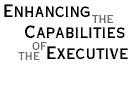I am the participant's Select... Self Superior Peer Subordinate Other: 1. Ability to work with problems and situations where the desired outcome is not clear Deals only with well defined problems. Over-simplifies problems in an effort to make things clear. Usually accepts a lack of clarity as a consequence of dealing with high level problems. Accepts and works well with a lack of clarity. Comfortable with a lack of clarity; tolerates the uncertainty that accompanies it for long periods of time. 2. Capacity for conceptual thinking Deals only with the tangible and concrete. Usually grasps concepts presented by others, A conceptual thinker who usually grasps concepts and the big picture. Utilizes concepts and generalizes learning from one situation to the next. Uses concepts to identify patterns that lead to innovative ideas. 3. Ability to deal with conflict in a positive and constructive manner Denies conflict even when it is pointed out. Avoids conflict whenever possible. Recognizes conflict but views it as something to be minimized. Will play the peacemaker and work toward closure of the conflict rather than resolution of the issue. Recognizes and deals with conflict in a non-defensive manner. Views conflict as part of organizational life. Comfortable with others taking a different point of view. 4. Knows when to make a decision and when to act Almost always rushes to make a decision without thinking things through. Sporadic, sometimes delays making a decision and sometimes decides too quickly. Will make a decision but does not see the big picture nor implications of a decision. Good decision maker, usually sees whole picture; collects information and then decides. Excellent decision maker, engages in intelligent risk taking. Is willing to decide after collecting necessary information. 5. Ability to take a corporate perspective Looks to identify and protect personal stake. Reluctantly focuses on issues outside immediate area of responsibility. Views problems and impact of solutions from corporate perspective. Takes ownership for tackling problems beyond immediate scope of work. Willing to make own needs secondary in the service of longer-term corporate objectives. 6. Perseverance Gives up too soon. Confronted with an obstacle, moves on to something else. Remains on track as long as observable progress is being made. Continues on in the face of resistance even if efforts are not showing immediate results. Challenged by obstacles; consequently, efforts are taken to a higher level.
7. Effectiveness Does not i dentify nor meet critical objectives. Busy, but there is a lot of wasted motion and effort. Generally gets the right job done. Productive and keeps a myriad of important projects moving forward. Identifies leverage points where efforts yield greatest results.
8. Delegation, able to enlist the help of others in the accomplishment of important tasks Does not really delegate at all. Retains all important, high visibility projects. Delegates, but it is usually work of lesser importance and consequence. Work of any consequence that is delegated, is micro-managed. Delegates, but is not always clear as to the desired outcome. Delegates work. Knows what is desired and articulates how it fits into the larger picture. Delegates work that takes into account the abilities and experience of the subordinate. 9. Ability to synthesize data Thinks one point or one problem at a time. Some ability to pull things together, but most comfortable with one data point at a time. Pulls elements together but only on projects and problems of a short- to mid-term nature. Synthesizes a wide range of information dealing with mid- to long-term problems. Synthesizes data and produces creative solutions to mid- and long-term business problems. 10. Able and willing to choose competent people for positions in the organization Consistently makes poor hiring decisions. Selects mediocre people. Selects good people. Selects quality people. Selects high quality people. 11. Plays as part of the team and demonstrates an appreciation for the power of the team An individual contributor. Demonstrates no interest or ability to be part of a team. Will work as part of a team when forced to, however, resists working in a coordinated team manner. Typically, works better on her/his own. Usually exhibits team behavior. Effective team member; understands team dynamics. Stimulates others to work together effectively in groups.
12. Openness to new ideas and willingness and ability to change Does not want to change and is not open to new ideas. Feigns an interest in new ideas and change, but behavior demonstrates a desire to maintain status quo. Appears to want to change and accept new ideas, however, is slow in doing so. Open to change and to new idea. Believes change is necessary and attempts to keep up with what's going on. Thrives on change. Views it as part and parcel of today's workplace.
13. Openness to feedback concerning own behavior and impact Becomes defensive when presented with negative feedback. Feigns an interest in feedback, but is typically searching for hidden agendas and may look for opportunities to retaliate. Somewhat open to feedback. Open to and comfortable with feedback. Response is non-defensive Actively solicits feedback from others.
14. Coaching, mentoring and developing people Does not believe in the development of people. Believes development is totally the individual's responsibility. Will help people develop as far as arranging for development experiences. This person is supportive of training and development efforts, but is not an active agent and part of the process. Willing to share information and spend time with whomever asks. Is a coach and mentor to others in the organization. Actively sought out by others. Able to suspend own needs to help others better understand themselves or a problem.
15. Communication Unable to convey information, thoughts and direction to others. Others must pull for information. Thoughts are not clearly expressed. Able to communicate ideas in his/her own field to colleagues but experiences difficulty translating for those with different frame of reference. Readily communicates and is generally clear and understood. Extremely articulate; able to convey complex issues to those outside her/his field of expertise. Readily shifts style to adapt to audience.
16. Empathy Does not read non-verbal behavior nor pick up on feelings. Late to pick up on feelings and does not appreciate the value of doing so. Generally, an empathic person. Aware of subtle cues, demonstrates empathy, and uses it to enhance business relationships. Tuned in to what others are feeling and utilizes empathy to build teams, relationships and alliances. 17. Integrity Tells you what you want to hear. Variable. Demonstrates integrity when it is easy or convenient to do so. Generally, a person of integrity and ethics. Operates from an ethical base and applies ethics to the realities of a business situation. Moves decisions to higher ground; incorporates concerns for long-term impact. 18. Listening skills Demonstrates little, if any, ability to listen. Pretends to listen, but is just holding tongue until the speaker is through. Confuses not talking with really listening to what the other person has to say. Listening skills are average. A good listener. Hears other people out and demonstrates understanding. Actively listens, which means demonstrating understanding of what has been said as well as the feeling or affect underlying the message. 19. Willingness to stand up to and deal with performance problems Denies or avoids dealing with people who are not doing their jobs. Isolates people who are performing poorly by shunting projects away from them. Deals with poor performers, but is not clear about the nature of the problem. Tells poor performers they are not measuring up and is willing to move into the progressive discipline process, as necessary. Steps up to and deals with poor performers. Clear performance and time measures are articulated and, if the person does not respond, will terminate employee.
20. Ability to learn from experience Does not learn from experience. Each experience adds something to the toolbox, but subsequent tasks are carried out in the same manner. Demonstrates an ability to learn from experience but sporadically applies the lesson to the next experience. Conducts post-mortems on workplace experience, and is usually able to apply the lesson to the next experience. Conducts post-mortems on workplace experiences and is almost always able to apply the lesson to the next experience.
Please answer the following narrative questions about the participant. 1. What does the participant do that motivates people to EXCEL? 2. What does the participant do that turns people off?



